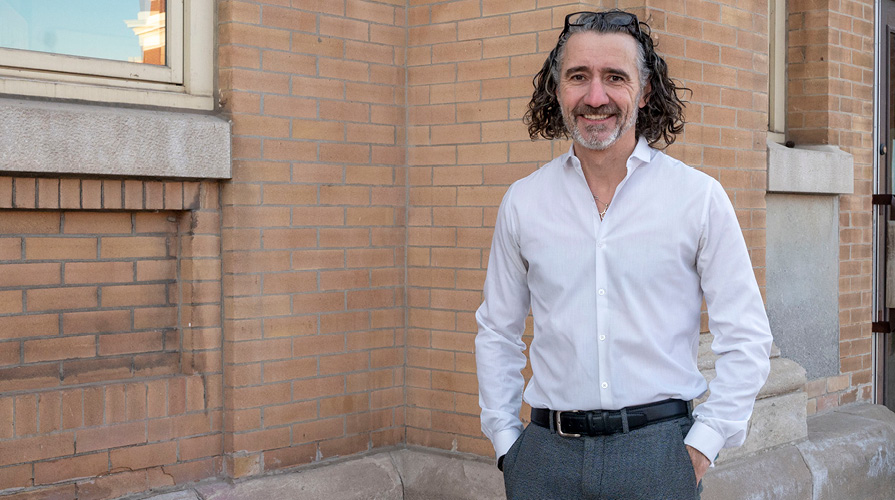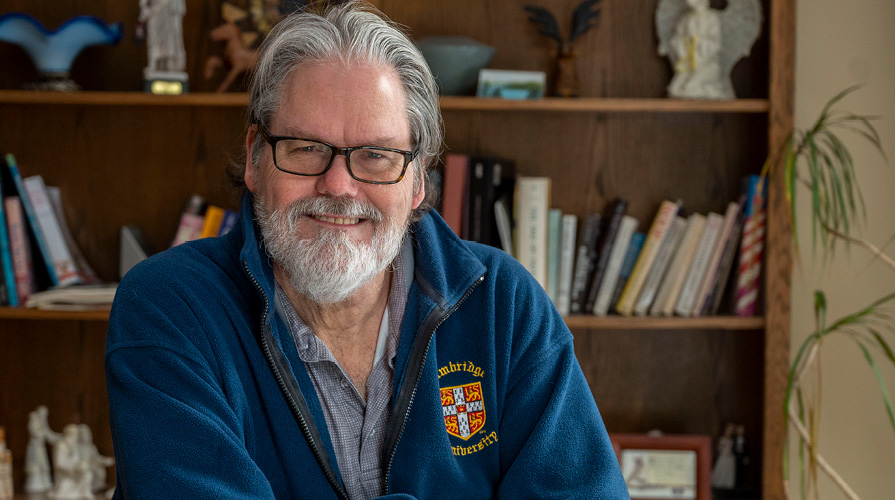Pandemic has exposed cracks in the system and specialists back OMA’s plan for change
News headlines like the one above about the lack of accessibility to mental health and addiction treatment are becoming more common in Ontario every day. The situation they describe is nothing new, although the pandemic has magnified the issues.
Dr. Chris Cavacuiti saw this same problem when he was beginning his work as an addictions specialist in the late 1990s. Many of the people he was treating had addictions to narcotics and were living on the streets. They needed methadone, often used to help people ease off their addictions. But the waiting lists for methadone treatments were incredibly long.
At the same time, HIV was just beginning to be treated effectively with new medications. “There were all sorts of very sad stories about people, for example, deliberately injecting themselves with HIV simply to get on your methadone treatment because that brought you to the top of the list,” Dr. Cavacuiti recalled. “It emphasized, for me, that there was definitely a huge need for more physicians doing this care.”
Almost 30 years later, he sees that same need.
 “There is a huge treatment gap in addiction health care,” Dr. Cavacuiti said. He now heads up trueNorth, an addiction medicine program with about 100 locations across Ontario. “There is often a subtle stigma about people struggling with addiction and a lack of understanding about the treatment they need. We need a unique approach to help this population and we need specialists to provide it.”
“There is a huge treatment gap in addiction health care,” Dr. Cavacuiti said. He now heads up trueNorth, an addiction medicine program with about 100 locations across Ontario. “There is often a subtle stigma about people struggling with addiction and a lack of understanding about the treatment they need. We need a unique approach to help this population and we need specialists to provide it.”
But Dr. Cavacuiti, who is chair of the Ontario Medical Association Section on Addiction Medicine, added that only about 200 of all Ontario physicians identify as addiction medicine specialists. And he said the COVID-19 pandemic has further exposed the weaknesses in providing care to a population that was already underserved.
“The isolation that has come from the pandemic has caused people with addictions to lose their social networks. That isolation creates depression, which just leads to more opioid use,” he said.
Photo: Addiction’s specialist, Dr. Chris Cavacuiti remarks that the COVID-19 pandemic has further exposed the shortage of specialized care available to Ontarians with addictions.
The statistics support what Dr. Cavacuiti is experiencing with his patients. The Canadian Institutes of Health Research has reported that in 2020, opioid-related deaths in Ontario rose by 40 per cent. And in September 2021, the Ontario COVID-19 Science Table noted that since “the onset of the COVID-19 pandemic in March 2020, rates of emergency medical services (EMS) for suspected opioid overdose increased by 57 per cent and rates of fatal opioid overdose increased by 60 per cent” in the province.
Dr. Cavacuiti and his colleagues have been seeing this increase first-hand. “It’s rare that a week goes by that we don’t receive an email from one of our doctors just to let everyone know a particular patient has died (from an overdose),” he said. “This has happened on a very regular basis.”
The Ontario Medical Association’s recently released Prescription for Ontario: Doctors’ 5-Point Plan for Better Health Care calls on the Ontario government to “expand mental health and addiction services in the community,” which is one of the five priorities of the OMA plan.
Specific recommendations include:
 The plan notes that while there is always an urgent need for treatment for mental illness — in any given year, one in five people in Canada experiences a mental health problem or illness — the pandemic has exacerbated the situation. And this surge includes everyone, from children to people living with addictions to overworked physicians.
The plan notes that while there is always an urgent need for treatment for mental illness — in any given year, one in five people in Canada experiences a mental health problem or illness — the pandemic has exacerbated the situation. And this surge includes everyone, from children to people living with addictions to overworked physicians.
It is certainly a problem that Dr. Michael Paré is seeing. He is a medical psychotherapist and in 1993, he founded the Medical Clinic for Person-Centred Psychotherapy, where he and other mental health physicians provide a range of therapies. The Toronto clinic has always been busy, but demand has been over-the-top since the pandemic began.
“It’s hard for us to know what the numbers are because we were overwhelmed by the numbers before,” said Dr. Paré, immediate past chair of the OMA Section on Primary Care Mental Health. “We had many times too many patients before the pandemic so, even if it was double, that wouldn’t really change much because we were overwhelmed before.”
Photo: The mental health problems patients are raising with Dr. Paré now are often directly related to the pandemic. He leads a group therapy session focused on relationships, which he has expanded to include discussion on the pandemic — because that’s what his patients wanted.
“A lot of the stress that people are talking about now is related to COVID. Patients are saying, ‘I feel so isolated,” or, ‘I’m not isolated enough. I’m here with my family 24/7.’ Often people will talk about how frustrated they are with COVID, feeling life has stopped. They’re angry and shocked by it. There are a lot of emotions about it. It’s a huge thing in terms of the impact on my patients.”
Some of Dr. Paré’s patients have had to resort to sitting in their cars on cold nights so they can take part in the group sessions because they can’t get privacy in their homes. Others whose personalities cause them to be fearful of other people have found that the forced isolation of pandemic restrictions has enabled them to avoid others. “But this isn’t healthy for them. It allows their avoidant personality behaviours to be entrenched.” On the other hand, he added, people who are more extroverted are suffering because of the isolation.
“The isolation that has come from the pandemic has caused people with addictions to lose their social networks. That isolation creates depression, which just leads to more opioid use.” —Dr. Chris Cavacuiti
Dr. Renata Villela, a psychiatrist with a practice in Thornhill, agreed that the pandemic has intensified mental illness and the need for treatment.
“There was already a shortage of mental health services going into the pandemic and now it’s just this tsunami of need that has come about,” said Dr. Villela, who is chair of the OMA’s Section on Psychiatry. “We’re dealing with people who were already struggling. And now, the pandemic has added an extra layer of stressors in their day-to-day lives. Then there are people who may have been doing well beforehand, but because of the pandemic, they now are seeking mental health services as well.”
She noted that there is a further layer of uncertainty with rapidly evolving scientific data that has, in some cases, been manipulated into misinformation and disinformation. As such, burnout and a spectrum of psychiatric illness, such as mood disorders, anxiety disorders, post-traumatic stress disorder, obsessive-compulsive disorder, eating disorders and substance use disorders have been exacerbated or have emerged anew, she said.
The increased stresses of the pandemic are also affecting physicians. Prescription for Ontario notes that surveys conducted by the OMA’s Burnout Task Force found that just prior to the pandemic in March 2020, 29 per cent of Ontario doctors reported high levels of burnout, with two-thirds experiencing some level of burnout. By March 2021, these rates had increased, with 34.6 per cent reporting high levels of burnout and almost three-quarters reporting some level of burnout.
“I think many are feeling the constant uncertainty, the evolving nature of everything that we’re trying to deal with and having to do things in such a different way,” Dr. Villela said. “It’s important to remember that physicians are only human and we have to remember to hit the pause button. It’s hard for you to be the best version of offering health care to others if you’re not taking care of yourself.”
Drs. Cavacuiti, Paré and Villela welcome the OMA’s Prescription for Ontario and its 87 recommendations, especially those related to mental health and addiction.
Often people will talk about how frustrated they are with COVID, feeling life has stopped. They’re angry and shocked by it. There are a lot of emotions about it. It’s a huge thing in terms of the impact on my patients.” —Dr. Michael Paré
Dr. Cavacuiti has long felt that there’s not enough connection between the various addiction professionals a patient might need to see. “I think the pandemic has really served to unmask the challenges that we have faced as front-line clinicians and we have our fingers crossed that this is going to be the wake-up call we need to look at a more integrated system because right now, it definitely is not an integrated system.”
Dr. Villela said offering patients a variety of integrated services will be helpful while also respecting that patients are all different. For example, both she and Dr. Paré are strong believers in the benefits of virtual care in making services more accessible for those patients who don’t want to or are unable to physically travel to see a mental health specialist. But Dr. Paré said in-person psychotherapy should be the norm where safety permits.
Dr. Villela said having a therapy session using technology like Zoom is not for everyone. “I believe in a ‘big tent’ approach and that there can be a time and a place for all of these different services. But it’s about really trying to match the patient’s need to what is going to be the best fit.”
Paul Fraumeni is a Toronto-based writer.